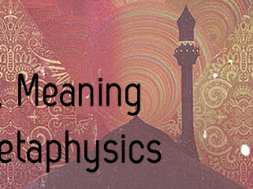![[DEEP DIVE] Music and the Metaphysical](https://thesightsandsounds.com/wp-content/uploads/2017/04/Musicmeaningandmetaphysics.png)
Music and the Metaphysical: An Examinaton
“‘If music be the food of love, play on; / give me excess of it, that, surfeiting, / the appetite may sicken, and so die,” says the Bard in the opening of his play, Twelfth Night, and in doing so, he
provides some profound and cogent insight into a subject as complexly abstract as music. Music, surely, is the one of the many “food[s] of love”, but love is just one of the comprehensive list of emotions that music can conjur e up or further incite. Is this not the primary reason that makes this collection of sound, be it cacophonic, euphonic, or otherwise, so enthralling? It is the evocative nature of it that makes it the enigmatic art form that is. The capacity of literature to move us to tears or bring us joy se
e up or further incite. Is this not the primary reason that makes this collection of sound, be it cacophonic, euphonic, or otherwise, so enthralling? It is the evocative nature of it that makes it the enigmatic art form that is. The capacity of literature to move us to tears or bring us joy se
ems logical; the age-old “sticks and stones” adage seems, from the earliest memories, implicitly untrue: words can hurt, and they can certainly do much more than that as well. Sound, though, is a different entity completely. The idea of patterned sound being evocative is a mystical one, yet since the dawn of man, there has been music, and this music has brought with it the same emotionally evocative qualities seen today.
It is from this vein that the idea of the metaphysical is introduced, and to begin to apply such a lens, a clear definition of “metaphysical” must be reached, especially considering the variety of uses and applications such a word sees. It can often be intimidating and become negatively entangled within the dense academic works it is often found, but the definition is certainly ascertainable: Merriam-Webster’s definition 2A defines ‘metaphysical’ as “of or relating to the transcendent or to a reality beyond what is perceptible to the senses”. To break this definition down into parts, it would be helpful to pay particularly close attention to the latter part: “what is perceptible beyond the senses”. There exists, of course, the physical world, made up of everything we can use our five senses to perceive, but then there are also things beyond that that we can understand at an almost internally perceptive level, and this is where abstract concepts such as love or music find their home. These things certainly have their physical aspects: the naturalist would describe love as a mixture of chemical reactions in the brain and music as arranged pattern of notes; but, even with those physically graspable facets in mind, we still understand these concepts as deeper than just a series of chemical reactions or a complex arrangement of notes on a scale: they have a deeper, transcendent quality to them… not quite indescribable, but instead, metaphysical.
It is with these very ideas in mind that the renowned German philosopher Friedrich Nietzsche (1844-1900), arguably the most influential thinker of the 19th century, took such a profound interest in music in one of his earlier works, The Birth of Tragedy. To summarize the main idea of Nietzsche’s stance, although dense and meticulously unpacked in a series of extended analogies, can be done with : Nietzsche feels that mankind is losing its sense of intuition and that this general degradation can be exemplified by two different sides of an artistic dichotomy reliant upon Hellenistic concepts, the Dionysian and Apollonian, with which he opens his work: “art owes its continuous evolution to the Apollonian-Dionysian duality… it is by those two art sponsoring deities, Apollo and Dionysus, that we are made to recognize the tremendous split, as regards both origins and objectives, between the plastic, Apollonian arts and the nonvisual art of music inspired by Dionysus” (Nietzsche, The Birth of Tragedy 1). 
To break this down, he views Dionysus, the god of revelry and festivity, as an example of the instinctual art, music, and he pays particularly close attention to Bacchic (Bacchae being followers of Dionysus) festivals, in which these followers would engage in particularly wild and lascivious behavior. He views Apollo, the god of music, art, and knowledge, as being the other side of this artistic spectrum, one more associated with the reason and logic more prominent in art forms such as literature or prose, and he believes the more humanity moves from the Dionysian towards the Apollonian, the more they suffer. Some confusion could surely arise from the fact that Dionysus is more closely associated with music in this analogy when Apollo was, in fact, the actual god of music. This, to Nietzsche, would not pose a problem. It is important to understand that this is not a concrete spectrum in which all music lies firmly on one side while all more logically inclined art forms stand immovable on the other; but, instead, this is a spectrum of intuition and freedom versus logic and reasoning, and that all art forms will have qualities representative of both sides.
A very important distinction for the purposes of both Nietzsche and metaphysical analysis has now been introduced: music with lyrics versus music withoutThe importance of this is found in the fact that it represents the spectrum itself, utilizing aspects from both sides uniquely to form an art form focused on the duality of these two natures, the logical (Apollonian) and the intuitive (Dionysian). In music with lyrics, the instrumental sounds encapsulate the raw, potent artistic impulse, yet the appearance of the written word adds a planned, more formulated quality: the lyrics accompany the music and, optimally, they will further the message of the sound. However, this is not always the case, and the reason for this is evident within Nietzsche’s musical pallet. Nietzsche loved music and revered it for the undefinable yet undeniable evocative quality it holds: “Ho w little is required for happiness! The sound of a bagpipe” Nietzsche exclaimed, then continued, “without music, life would be an error” (Nietzsche, Twilight of Idols #33). Throughout his works, Nietzsche comments on the works of many a famous musician: Beethoven, Bach, Handel, Mozart, Schumann, all are composers Nietzsche lauded passionately. The most notable part of this list, however, is that which these names share: they are composers of grand symphonies and commanders of orchestras capable of some of the most powerful productions of sound possible; they are, most simply put, connoisseurs of the classical variety. It is in the limited nature of his tastes that Nietzsche’s truth shines through; he listened to almost entirely classical music because he believed the lack of lyrics present and the focus on music as a sheer force was as intuitively metaphysical, as Dionysian, as art could get. He felt that lyrics, although they can sometimes optimize a piece, are, by their very nature as carefully planned human constructs, dangerous when it comes to music and that they more often than not detract from the profundity within the force of it itself. These ideas, which Nietzsche briefly alludes to if only to further the Apollonian-Dionysian analogy, are not fully Nietzsche’s alone, which he willingly acknowledges, citing the influence of another German philosopher who influenced him greatly and was slightly before his time, Arthur Schopenhauer.
w little is required for happiness! The sound of a bagpipe” Nietzsche exclaimed, then continued, “without music, life would be an error” (Nietzsche, Twilight of Idols #33). Throughout his works, Nietzsche comments on the works of many a famous musician: Beethoven, Bach, Handel, Mozart, Schumann, all are composers Nietzsche lauded passionately. The most notable part of this list, however, is that which these names share: they are composers of grand symphonies and commanders of orchestras capable of some of the most powerful productions of sound possible; they are, most simply put, connoisseurs of the classical variety. It is in the limited nature of his tastes that Nietzsche’s truth shines through; he listened to almost entirely classical music because he believed the lack of lyrics present and the focus on music as a sheer force was as intuitively metaphysical, as Dionysian, as art could get. He felt that lyrics, although they can sometimes optimize a piece, are, by their very nature as carefully planned human constructs, dangerous when it comes to music and that they more often than not detract from the profundity within the force of it itself. These ideas, which Nietzsche briefly alludes to if only to further the Apollonian-Dionysian analogy, are not fully Nietzsche’s alone, which he willingly acknowledges, citing the influence of another German philosopher who influenced him greatly and was slightly before his time, Arthur Schopenhauer. 
Schopenhauer (1788-1860) is one who must be brought up any time things within the realm of aesthetics (such as music, for these purposes) is to be analyzed, and the Stanford Encyclopedia of Philosophy notes this, saying that “since his death in 1860, his philosophy has had a special attraction for those who wonder about life’s meaning, along with those engaged in music, literature, and the visual arts”. Two of these facets will be of particular attention when discussing Schopenhauer and music and especially so when working towards unraveling the complex riddles of the latter. Schopenhauer, in true, German-philosopher form, was not the most upbeat of people: “[his] pessimism the most well-known feature of his philosophy, and he is often referred to as the philosopher of pessimism. [his] pessimistic view follows from his account of the inner nature of the world as aimless blind striving” (Troxell). In order to understand Schopenhauer’s analysis and the value he accredited to music, it is important to understand his philosophy, however bleak it may be.
The primary subject of this belief is what Schopenhauer refers to as “the will”, which is conveniently exactly the way will is commonly understood: “something desired; especially: a choice or determination of one having authority or power” (Merriam-Webster 2a). Schopenhauer feels that like consists of an endless string of desires, which are either willed to fruition or frustratingly left unfulfilled. From this, his dark views evolve: “Since existence is marked by want or deficiency, and since satisfaction of this want is unsustainable, existence is characterized by suffering… even with the use of reason, human beings can in no way alter the degree of misery we experience; indeed, reason only magnifies the degree to which we suffer. Thus all the ordinary pursuits of mankind are not only fruitless but also illusory insofar as they are oriented toward satisfying an insatiable, blind will” (Troxell). It is as a result of rather dreary sentiments like these that Schopenhauer’s adornment and fixation on aesthetic are born: “[A]esthetics is at the heart of philosophy for Schopenhauer: art and aesthetic experience not only provide escape from an otherwise miserable existence, but attain an objectivity explicitly superior to that of science or ordinary empirical knowledge” (Janaway).
As noted, however, Schopenhauer paid particularly close attention to music and, more importantly, that seemingly indescribable yet powerful quality it naturally possesses. He, however, demonstrates an uncanny ability to vocalize that which seems indescribable, as he would often try to put that effect into words: “[m]usic … stands quite apart from all the [other arts]. In it we do not recognize the copy, the repetition, of any Idea of the inner nature of the world. Yet it is such a great and exceedingly fine art, its effect on man’s innermost nature is so powerful, and it is so completely and profoundly understood by him in his innermost being as an entirely universal language, whose distinctness surpasses even that of the world of perception itself… we must attribute to music a far more serious and profound significance that refers to the innermost being of the world and of our own self” (Popova). If there were ever any quote that got remotely close to putting a face to the way in which music operates, this would certainly be the one. Music truly does “affect man’s innermost nature” in a way that speaks to the listener in an “entirely universal language, whose distinctness surpasses even that of the world of perception itself”, and what definition is assigned to that which operates on a level beyond perception? It is referred to as the metaphysical… and now it would seem things have come pleasantly full circle. Schopenhauer’s insights continue, though, when he attempts to describe how exactly music functions on this level: “the effect of music is so very much more powerful and penetrating than is that of the other arts, for these others speak only of the shadow, but music of the essence. The inexpressible depth of all music, by virtue of which it floats past us as a paradise quite familiar and yet eternally remote, and is so easy to understand and yet so inexplicable, is due to the fact that it reproduces all the emotions of our innermost being, but entirely without reality and remote from its pain” (Popova). It is this idea of capturing the “essence” rather than the “shadow” that truly hits on what music can do. Art in its other forms can utilize techniques to indirectly communicate theme–the characters within a play work through the script, the characters in a novel progress, and the painter or artist hopes to portray his message through his brushstrokes, yet all are fallible: the play often falls flat, the novel often bores or leaves one confused, and the poem works similarly so. Why then does music have the quality and the approachability, the ease of access, that it does? How can it capture that essence as opposed to shadow? The answer stems from the substance itself: music is essence, while all other art forms are shadow. The play and novel are human attempts at defining essence, at defining those natural yet unattainable conceits that we as man struggle with: how to live, how to love, concepts of pain, of joy, of history, whether recent or ancient. The playwright, the author, or the poet all examine these conditions or ideas (the essence) and hope to work through their chosen medium (the shadow) in order to convey a message about such. For some, often those who can identify with the experiences or sentiments of the artist, the shadow is identified and the essence received; for others, nay, for most, the shadow remains a shadow, and all that is retracted are bits and pieces of the true core meaning, of the essence.
Music, however, escapes this pitfall through its very existence! Music is sound, no more and no less. Sound is far from a human creation; sound is anything but a human medium. Sound is natural. The musician takes and reorganizes while any of the aforementioned creators are working from scratch, and it is in this crucial difference that the former finds its supremacy in evocation while the latter is often left lacking. It is through this organization, utilizing tones, semitones, and the infinite amount of combinations of chords and musical techniques, that this natural substance takes its form as song; the essence is not filtered through a medium, but instead, it is simply refashioned into a different and clearer shape. The sad, soft tickling of a jazz piano arises from an organizational shape which implicitly and naturally suggests sadness, wanting, and melancholy to the listener; the triumphant sounding of a trombone, on the other hand, forms a figure reminiscent of victory, of joy, and of valiance. The shapes are made, borne from natural material of sound, of essence, of things all around us, into an outline or a form, which leads to the pervasive nature of music, this idea that it surrounds us and encapsulates all things, captured eloquently by Lord Byron in his satiric poem, Don Juan:
“There’s music in the sighing of a reed;
There’s music in the gushing of a rill;
There’s music in all things, if men had ears:
Their earth is but an echo of the spheres.”
Music can be found in all things, it would seem, and this begs the question of where this transcendent, evanescent nature stems from. The answer is multidimensional. The organization by the composer, this ordering of sound and natural essences, is only half the battle. It is then then the duty of the listener to assign meaning to the piece; yes, the form is there to suggest and subtly guide, but it is through the listener that the specificity is found and the true, metaphysical evocation emerges. The arrangement of the sounds of that softly crooning piano is suggestive and works as a guide to the emotion and conceit, yet it is only when the listener personalizes it–perhaps through thoughts of ex-lovers, lost family members, or particularly sad or trying times within their respective life–that the impact is fully realized and the process complete. The form, through the listener’s own metaphysical, highly personalized experiences and interaction with the piece, is assigned essence, each specific, but similar, to one and other.
Where, then, does this essence of one’s self stem from? The answer should not be unfamiliar to anyone with a well-rounded knowledge of music as a whole. Jazz, often referred to as the most intuitive and naturally occurring genre of music, is a good starting point for this inquisition. Interestingly enough, in Jean-Paul Sartre’s La Nausea, in which his protagonist finds himself in the midst of a seemingly incurable sickness of the world, not unlike the suffering Schopenhauer himself thought an unavoidable factor within the lives of all men, one of the few, if temporary, remedies was the improvisational jazz music playing at a nearby club (Sartre). It was undoubtedly the improvisational aspect, which is such a staple of jazz music, that assuaged the protagonist’s general discontent with the boredom of the human world he found himself in. It spoke to a deeper part of him, a part which coincidentally enough shares its name with another type of music, one that falls under the umbrella of jazz: soul.
The soul is the embodiment of everything metaphysical about a human being: it contains his or her essence. In his poem Peter Quince at the Clavier, Wallace Stevens opens with an insightful and relevant quote about music and the soul: “Just as my fingers on these keys / Make music, so the self-same sounds / on my spirit make a music, too.” This passage, with its poignant brevity, speaks on the process of soul and essence beautifully. The “self-same sounds” make music on the spirit–the sound, the natural essence, finds its form through the piano keys, and this in turn makes a music on the spirit and the soul as the essence is provided from within! This beautiful, symbiotic relationship captures the essence of music itself, one working to create form through a natural medium of sound and being reciprocated by the human soul, this enigmatic and metaphysical core of emotion, experience, and general being all men possess.
Kurt Vonnegut, one of the most influential American writers of the 20th century, expresses the beauty and meaningfulness brought by music well in one of his most famous quotes: “If I should ever die, God forbid, let this be my epitaph: THE ONLY PROOF HE NEEDED FOR THE EXISTENCE OF GOD WAS MUSIC”. Music, as has been explored, finds its roots buried deep into something human beings cannot fully understand and can only hope to define. Music is simultaneously explosive and tame, it is smooth and it is brash; music is capable of bringing the strongest of men to their knees sobbing and making the most diminutive man feel like he is the king of the world. It is, at times, inspiring and uplifting, while at other times, it can intimidate or frighten… but it is anything if not soulfully unpredictable, much like the life itself, and I cannot help that from this it finds its truest sense of beauty.
138









